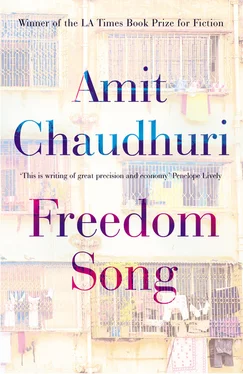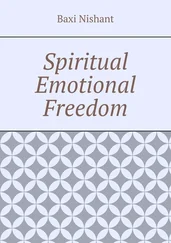Twice a week, they’d go to a nursing home in Dhakuria. It was a new place, built on a field that had once been empty. A by-lane of two-storeyed houses and trees led to it. Because the building itself was new, with a flat white façade that had red borders, it looked like a mirage, as all new things do in Calcutta. And then it had those tinted glass doors at the entrance that kept its interior a secret and imaged the world outside, and those new, flourishing money-plants on the porch that shone so, that they seemed to be made of plastic. Not to speak of the watchman in khaki, like a large ragged doll, the winter light falling on the stubble on his face.
‘Ma Sharada Devi nursing home,’ said Khuku to Mritunjoy, the driver.
The words were enough to please Mini. She was something of a devotee of Ramakrishna and Swami Vivekananda; had long been one; not a formal one, but one who’d read their books, life stories, and sayings.
‘Who built the nursing home, re?’ asked Mini.
‘I don’t know,’ said Khuku, who’d never had much interest in facts. She relied on instinct. ‘It’s a good, clean place,’ she said.
Some doctor had recommended it to her when she’d needed a check-up (both check-ups and age had nudged Khuku, who felt so inwardly young, and surprised her into disbelief), and she had recommended it to Mini when she realized she required treatment. In her mind, the place had become associated with healing and a certain stage in her and Mini’s life, and afternoons when her husband was at work.
Her husband at work — seventy years old, hair half grey; yet the five thousand rupees coming in per month from a ‘sick’ company was useful in all kinds of small ways. It needn’t remain sick, now that her husband was in it. But lately Shib had said, sombre in his sleeveless slip-over, ‘I don’t know why they’ve taken me.’ He’d shaken his head. ‘The government isn’t interested in putting money into the company. I don’t know if they expect me to perform some miracle and put it on the right course again.’ He was unlikely to make any miracles happen, presiding over in his active old age this company he’d known since childhood. ‘I’ve heard that there are some people who resent that money’s being diverted from a loss-making firm to pay my salary — so it’s best not have any expectations.’
Here, at the entrance of the lane, was a sprawling rubbish-heap of an unimaginable colour — but the two women in the car wouldn’t notice it. Mini was wearing a white tangail sari with a slender green border, and a dark cardigan; bent forward slightly, she was a mixture of light and dark this afternoon. Many times Khuku had persuaded her to wear brighter colours, but she had always refused; not saying why, but on the unspoken grounds of her age, and being single; it was just a preference and a belief she had.
Through traffic jams, bursts of exhaust fumes, a mad chorus of car horns, they’d come, passing the ‘boulevard’ in Gariahat, with its tinsel and Christmas caps hanging from the stalls, and its portraits of Ramakrishna and imitation Rembrandts, empty exercise books and jars of spices and generators; then the roundabout at Gol Park. Through all this they’d come.
The nursing home rose before them like a mirage. All the doctors attending to Mini had come to know both of them well — and addressed them as ‘mashima’. There was Dr Sarkar and Dr Majumdar, both of them young enough to be Khuku’s sons; both most courteous, and attentive to Mini, saying, ‘Mashima, sit here,’ and, ‘Tell me, how is the problem now?’ Khuku remembered her son when she saw these two young doctors, and then she told them about him; and they seemed interested and always had five minutes to spare to have a relaxed chat with her. They’d got to know how Bablu was in America, doing a doctorate in economics, and how her husband was still working in a company. ‘That’s good,’ Dr Sarkar had said. ‘Men age quickly if they don’t work.’ Khuku had been pleased with this; she’d thought, Then it doesn’t matter that it’s not a good company, at least he’s doing a job. When they examined Mini, Khuku either sat in one of the chairs in the hall, or stood in the corridor outside which received weak sunshine from the frosted window on the door at its end, the door that opened onto a dusty space at the back where the cars were parked. She thought how strange life was, that she was here and Bablu was in America and her husband in the office, and that there was a clean nursing home in Calcutta with good doctors; she was full of wonder at how one person ended up in one place and someone else in quite another.
When they’d finished they headed back the same way, but going down the by-lane Khuku was always tempted to visit the house, in one of the lanes nearby in Jodhpur Park, her elder sister had lived in. Of course, her elder sister was dead; but her daughter, Puti — Khuku’s niece — and Manas, her son, were still there, living in different flats in the same house; as were her grandchildren, Khuku’s grand-nephews, Puti’s son, Mohit, and Manas’s, Sameer. Both were fond of Khuku, their ‘Didimoni’, but of the two it was the younger, Sameer, less hard-working and mindful of his studies than Mohit, who was the more openly demonstrative of his affection towards his grand-aunt, ready to melt in her arms, and who always had a kiss for her. Puti, too, after the death of her mother, had begun to see Khuku, her only aunt, in another light (although both sisters had been different in every way, including appearance, Puti’s mother fair skinned with fine thinning hair, and ten years older than her sister, almost everything about Khuku these days reminded Puti of her mother). She — whom Khuku had called, simply, Didi — had died just over a year ago of Parkinson’s disease. Her brain hadn’t been affected, thank God; but her movements had been reduced to a minimum until, finally, she hadn’t been able to get up from the bed without the help of nurses. At least she hadn’t suffered terribly; anyway, it had seemed to Khuku, there was nothing Didi had liked better than lying in bed with a magazine; and this it had been possible for her to do till a few months before she had died; in this sense, it had been a happy ending. When Khuku visited her, she’d find that Didi was still eager to take part in conversations. She’d open her mouth and form a few words to ask a question, and Khuku would have a clear view of her betel-stained upper teeth, which protruded slightly; and when the others gossiped, she’d listen, her eyes moving and registering surprise, disbelief, and amusement. Thank God she had had hired nurses always attending to her — not everyone had a rich son in America to pay for their medical expenses; she might have died much earlier had she not been so well looked after.
Now and then, their voices could be heard; not the voices in which they spoke to Khuku, but those that they reserved for themselves. They did not bother to speak softly; there was no one else in the flat. It had not been so silent since the days of the curfew.
Khuku often thought that three servants were too many to have in the house; there was only herself and Shib; and these three, for large stretches of time in the day, had nothing to do. Then they reigned like angels or demons without another habitation. They were itinerants, of course; three months later, they might not be here. Only Nando, even when he left, returned again and again.
‘What do you think you’re doing?’
It was Uma. Nando had reached forward and transferred an egg from his plate to hers. The egg was more than an olive branch; it was a testimony of his intentions towards her. Love, or something like it, had possessed him.
Читать дальше












